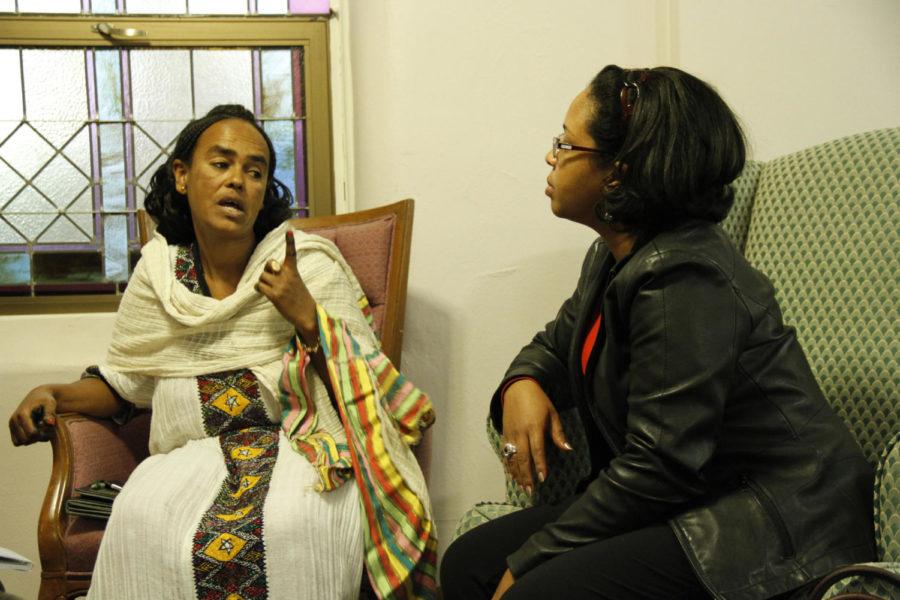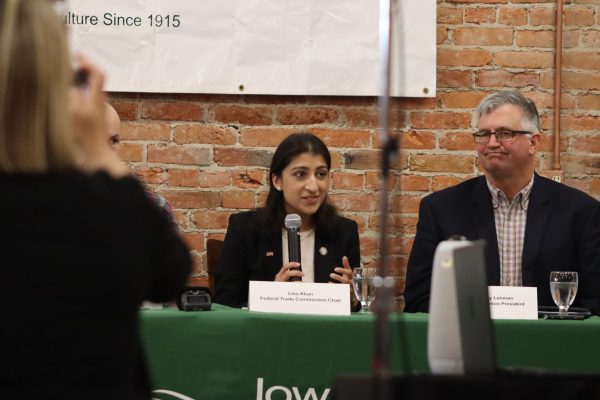Ethiopian farmers visit Ames
October 14, 2014
Imagine a husband dead, four children to take care of and not knowing where the next meal will come from. The only way to survive is begging on the streets.
Birtukan Dagnachew, recognized as an outstanding farmer in her home country of Ethiopia, faced food insecurity 14 years ago and now is running her own farm. She is visiting Ames this week to learn about agriculture from Iowa farmers.
“I came [to America] as a goodwill ambassador for female farmers in Ethiopia,” Dagnachew said. “I would like to learn more from the farmers here.”
She and Dadi Buta were the Ethiopian farmers chosen to tour the United States to not only learn about farming but also to share their stories.
Oxfam America is sponsoring the tour. The company seeks to develop partnerships to find solutions to poverty, hunger and social injustice around the world.
Jim French, senior advocacy adviser in agriculture for Oxfam, helped to plan the tour for the partners involved with extension service revitalization in Ethiopia. Oxfam is working with nonprofits like Sasakawa Africa Association, which promotes agricultural development, governments, extension agents and farmers in Ethiopia.
French said they chose Dagnachew and Buta because they both had won awards for farming and were involved in teaching other farmers in their own area.
“You can have technology, you can have programs you can invest in, but you have to have that network that’s able to grow and become accepted by farmers,” French said.
The tour visited Washington, D.C., and they presented their work to the legislature as well as to committees involved with developing extension programs in Africa.
They will talk at the World Food Prize conference in Des Moines to make recommendations about what leaders need to have in mind when they work on agriculture development.
Buta never made it past the eighth grade, was recruited by the military and ended up as a farmer. He inherited about 15 acres of land from his father. He turned to farming so his children would be able to finish school, something Buta never had a chance to do.
His production has increased to support his children going to school, building a better house and providing his family a living.
“Production has increased because I apply what I learn,” Buta said.
Buta goes to farmer learning centers through an outreach program where he gets better seeds and learns how to be a better farmer by learning new techniques.
“I apply what I learn ,and I share with others. I mentor five other farmers,” Buta said.
Like Buta, Dagnachew went into farming in order to provide a life for her family. A woman farming is frowned upon in the community, but she had no other way to provide for her family.
“I had no choice. I had promised to raise my children well. Even if it’s challenging for a woman to farm by myself — there was no other way,” Dagnachew said.
She was named a 2012 Female Food Hero in an continent-wide program that recognizes successful female farmers.
“Others are seeing what we have done and what we have accomplished and are realizing women farmers are valuable,” Dagnachew said.
Dagnachew farms 4.4 hectres that are filled with coffee, papya, avocado, lemon, tomatoes, peppers and more. She also has planted trees to sell as lumber.
As a child, Dagnachew was food insecure, which meant that she didn’t know where her next meal was coming from, and she didn’t want that for her children. After her husband died, her family received food aid for a couple of years until she started farming.
Nine years later, her family is food secure, and she has built a house to rent to people and has her own savings account.
“I don’t receive food aid anymore; I help others,” Dagnachew said.
Dagnachew hopes to bring back farming techniques to share with the women she mentors. She wants to share all that she’s learned so that others can achieve what she has achieved.
“Many women are uneducated [and] don’t have access to education,” Dagnachew said. “I ask you to keep supporting us until we can stand on our own two feet.”

















